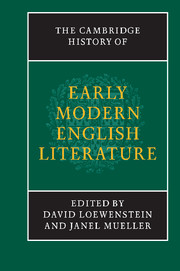Book contents
- Frontmatter
- Introduction
- 1 Modes and means of literary production, circulation and reception
- 2 The Tudor era from the Reformation to Elizabeth I
- 7 Literature and national identity
- 8 Literature and the court
- 9 Literature and the church
- 3 The era of Elizabeth and James VI
- 4 The earlier Stuart era
- 5 The Civil War and Commonwealth era
- Chronological outline of historical events and texts in Britain, 1528–1674, with list of selected manuscripts
- Select bibliography (primary and secondary sources)
- Index
- References
7 - Literature and national identity
from 2 - The Tudor era from the Reformation to Elizabeth I
Published online by Cambridge University Press: 28 March 2008
- Frontmatter
- Introduction
- 1 Modes and means of literary production, circulation and reception
- 2 The Tudor era from the Reformation to Elizabeth I
- 7 Literature and national identity
- 8 Literature and the court
- 9 Literature and the church
- 3 The era of Elizabeth and James VI
- 4 The earlier Stuart era
- 5 The Civil War and Commonwealth era
- Chronological outline of historical events and texts in Britain, 1528–1674, with list of selected manuscripts
- Select bibliography (primary and secondary sources)
- Index
- References
Summary
England
At one level national identity is little more than xenophobia: that gut reaction which provokes verbal and physical violence against strangers and outsiders. It had appeared in fifteenth-century riots against Flemings and Italians; and it appeared in the ‘Evil May Day’ riot of 1517 against foreigners. An anonymous Italian observer, writing of the English about 1500, declared ‘They have an antipathy to foreigners, and imagine that they never come into their island but to make themselves masters of it, and to usurp their goods.’ There was a positive side to such feelings, but it was equally unattractive. The same observer continued: ‘The English are great lovers of themselves, and of everything belonging to them; they think there are no other men than themselves, and no other world but England. And whenever they see a handsome foreigner, they say that “he looks like an Englishman”.’ Such sentiments do not appear in English writings of the period, which were seldom aimed at a popular readership, but they were widespread at all social levels. English nobles attending Henry VIII in the highly competitive atmosphere of the Field of the Cloth of Gold (1520) declared that if any French blood ran in their veins, they would cut it out with a knife.
- Type
- Chapter
- Information
- The Cambridge History of Early Modern English Literature , pp. 199 - 228Publisher: Cambridge University PressPrint publication year: 2003

